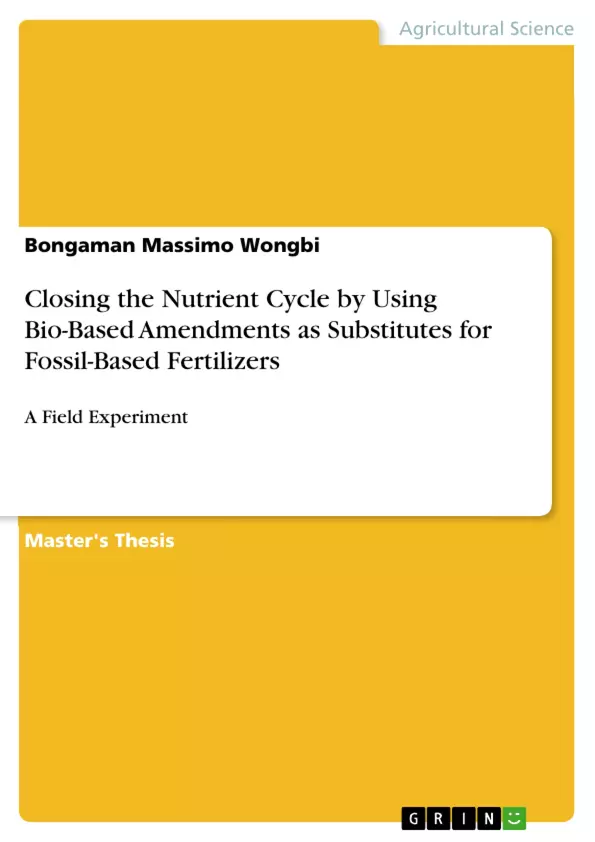In the transition from a fossil to a bio-based economy, it has become an important challenge to maximally recycle valuable nutrients that currently end up in waste streams. Nutrient resources are rapidly depleting. Significant amounts of fossil energy are required for the production of synthetic fertilizers, whereas costs for energy and fertilizers are increasing.
The goal of this thesis was to evaluate the impact of bio-amendments instead of synthetic fertilizers. It aims to i) identify the impact of the different scenarios on the soil fertility ii) the influence of bio-amendment substitutes on the soil quality and iii) the impact of the applied amendment on the plant nutrient contents. Eleven scenarios were designed from liquid manure, digestates and scrubber water.
Their application resulted in no nitrate pollution according to the Flemish Manure decree in the top 90 cm of the soil. Also there was no negative impact on the soil quality and soil fertility though soil degradation needs to be monitored in the long term. Moreover, the nutrient status of the experimental field was already quite high to begin with. However, the lack of a reference treatment precluded the real evaluation of the potential of the bio-amendments on soil quality and crop yields. Meanwhile, biogas production through anaerobic digestion produces nutrient rich digestates, which could potentially be reused as green fertilizers in agriculture, thereby providing a sustainable substitute for synthetic fertilizers.
Inhaltsverzeichnis (Table of Contents)
- ACKNOWLEDGEMENT
- TABLE OF CONTENTS
- LIST OF TABLES
- LIST OF FIGURES
- DEDICATION
- ABSTRACT
- CHAPTER ONE
- 1.1 BACKGROUND OF STUDY
- 1.2 PROBLEM STATEMENT
- 1.3 SUBJECT JUSTIFICATION
- CHAPTER TWO
- 2.1 INTRODUCTION
- 2.3 DIGESTATE PRODUCTION AND THEIR NUTRIENT CONTENT
- 2.4 DIGESTATE SEPARATION
- 2.5 NUTRIENT ELEMENT NITROGEN RECOVERY
- 2.5.1 AMMONIA STRIPPING
- 2.5.2 AIR SCRUBBER
- CHAPTER THREE
- 3.1 SOIL SAMPLE PREPARATION
- 3.2 CHEMICAL ANALYSIS
- 3.2.1 NITRATE
- 3.2.2 SOIL PH
- 3.3 ELECTRICAL CONDUCTIVITY (EC)
- 3.4 TOTAL NITROGEN
- 3.5 MAJOR NUTRIENTS
- 3.6 AVAILABLE MAJOR NUTRIENTS
- 3.6.1 SOIL ANALYSIS
- 3.6.2 PLANT ANALYSIS
- 3.7 STATISTICAL ANALYSIS
- CHAPTER FOUR
- 4.1 SOIL QUALITY
- 4.2 SOIL NUTRIENT STATUS
- 4.3 PLANT NUTRIENT CONTENT
- CHAPTER FIVE
- 5.1 IMPACT OF BIO-BASED AMENDMENT ON SOIL FERTILITY AND SOIL QUALITY
- 5.1.1 SOIL QUALITY
- 5.1.2 SOIL FERTILITY
- 5.2 IMPACT OF BIO-BASED AMENDMENT IMPACT PLANT NUTRIENT CONTENT
- 5.3 CONCLUSION
- 5.1 IMPACT OF BIO-BASED AMENDMENT ON SOIL FERTILITY AND SOIL QUALITY
- REFERENCES
- APPENDIX
Zielsetzung und Themenschwerpunkte (Objectives and Key Themes)
This Master dissertation explores the potential of using bio-based amendments as substitutes for fossil-based fertilizers to close the nutrient cycle. The study focuses on a field experiment investigating the impact of these amendments on soil fertility, soil quality, and plant nutrient content.
- Investigating the effectiveness of bio-based amendments in enhancing soil fertility and quality.
- Assessing the impact of bio-based amendments on plant nutrient uptake and growth.
- Exploring the potential of bio-based amendments to reduce reliance on fossil-based fertilizers.
- Analyzing the nutrient recovery process from digestate, a key component of bio-based amendments.
- Evaluating the environmental and economic implications of using bio-based amendments in agriculture.
Zusammenfassung der Kapitel (Chapter Summaries)
- Chapter One: This chapter provides the background of the study, outlining the importance of closing the nutrient cycle and the challenges associated with conventional fertilizer use. It also defines the problem statement and justifies the subject of the research.
- Chapter Two: This chapter delves into the production and nutrient content of digestate, a key bio-based amendment. It explores different methods of digestate separation and focuses on nitrogen recovery techniques, particularly ammonia stripping and air scrubbing.
- Chapter Three: This chapter details the methodology used in the field experiment, including soil sample preparation, chemical analysis, and statistical analysis. It describes the techniques employed to measure soil quality, nutrient status, and plant nutrient content.
- Chapter Four: This chapter presents the results of the field experiment, focusing on the impact of bio-based amendments on soil quality, soil nutrient status, and plant nutrient content.
Schlüsselwörter (Keywords)
This Master dissertation focuses on the following key concepts: bio-based amendments, nutrient cycling, soil fertility, soil quality, plant nutrient content, digestate, ammonia stripping, air scrubbing, sustainable agriculture, and environmental impact.
Frequently Asked Questions
What is the main objective of using bio-based amendments?
The goal is to substitute fossil-based synthetic fertilizers with recycled nutrients from waste streams, such as manure and digestates, to close the nutrient cycle.
What are the environmental benefits of these amendments?
They help reduce reliance on energy-intensive synthetic fertilizers and can be applied without causing nitrate pollution, as demonstrated in the top 90 cm of the soil in this study.
What is digestate and how is it used?
Digestate is a nutrient-rich byproduct of biogas production through anaerobic digestion. It can be separated and processed to recover nitrogen via methods like ammonia stripping.
Did the study show any negative impacts on soil quality?
No immediate negative impact on soil quality or fertility was found, although the study suggests that soil degradation should be monitored in the long term.
What nitrogen recovery techniques are discussed?
The thesis explores ammonia stripping and the use of air scrubbers to recover nitrogen from liquid manure and digestates.
- Quote paper
- Bongaman Massimo Wongbi (Author), 2013, Closing the Nutrient Cycle by Using Bio-Based Amendments as Substitutes for Fossil-Based Fertilizers, Munich, GRIN Verlag, https://www.grin.com/document/304378



